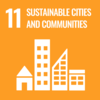The University of Pennsylvania’s Travel Sustainability Working Group was developed to identify and communicate near and long-term solutions to promote reduction and overall containment of air travel and assess and identify carbon offsetting strategies to address remaining travel that is a necessity of one’s work. Air travel booked for Penn’s faculty, staff, and students through the University represents approximately 10% of Penn’s carbon footprint.
In 2020-2021, this group established a Travel Sustainability Fund to invest in best-fit sustainability projects to fully offset the carbon impacts of the University’s air travel. This fund is supported by a Climate Impact Offset (CLIO) charge, which is applied to air travel as of July of 2021.
CLIO will offset air travel by purchasing offsets from a market provider, but Penn is working to identify local offset projects to maximize impact, while also committing to purchase verified carbon offsets that meet the Second Nature’s carbon offset guidance.



